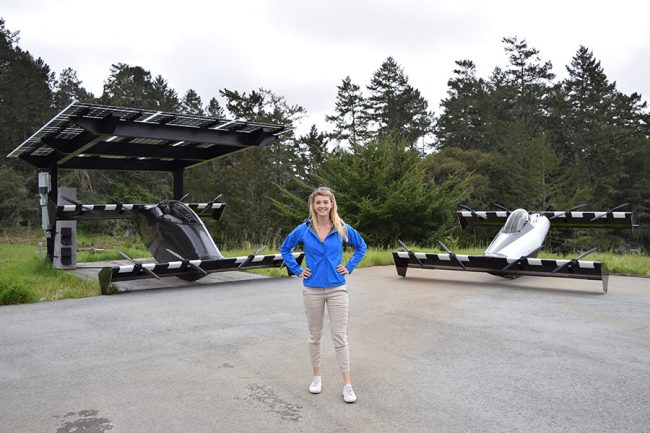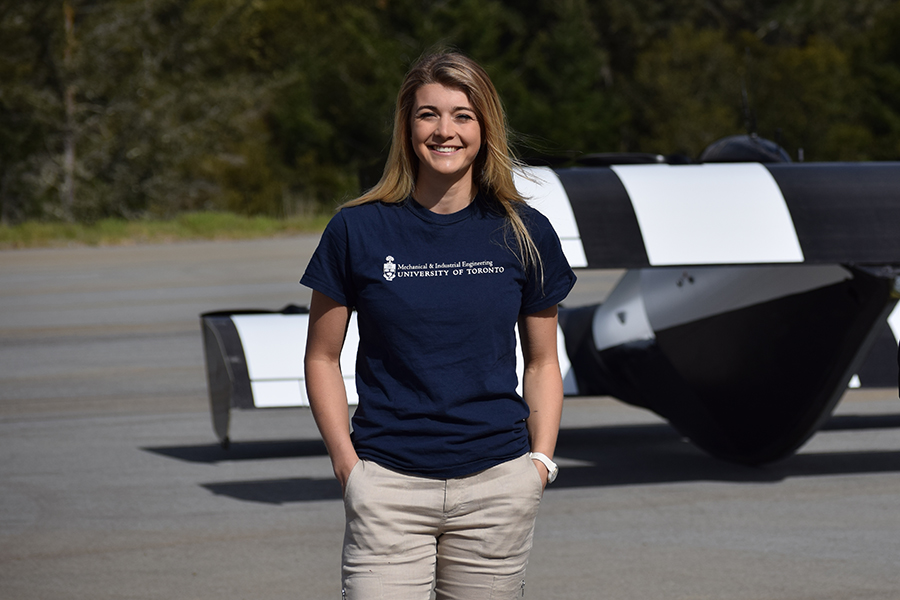
Kristina Menton (MechE 1T4 + PEY) loves airports.
“I love sitting in the midst of all the people and chaos, watching the airplanes take off,” she says. “I love everything about their aerodynamics, the beauty of the physics that make them fly.”
Lately, Menton has been experiencing those aerodynamics in a whole new way. As Director of Operations – Flight Testing & Propulsion Lead at Opener, Menton is a key member of the team behind the BlackFly, an all-electric, one-passenger aircraft capable of vertical take-off and landing (VTOL).
“It’s not a flying car, because it doesn’t have wheels and it can’t go on the road,” she says. “It is a personal aerial vehicle. It takes someone from point A to point B, through the sky.”
Menton didn’t apply for a job at Opener — the company came looking for her while she was still an undergraduate. She already had experience with jet engines, having interned with Pratt & Whitney Canada through U of T Engineering’s Institute for Multidisciplinary Design & Innovation. But her new job was something else entirely.
“I loved working in aerospace, but generally speaking, it’s a slow-moving industry,” she says. “What made this exciting was the chance to be at the leading edge of something new, which is electric aviation. I’m not someone who generally says no to a challenge.”

At first the company was operating in stealth mode; Menton couldn’t even tell her friends and family what she was working on. Within a year, she was made Head of Propulsion. Soon after that, she got her first chance to take a test flight.
“I had seen the aircraft fly autonomously for thousands of kilometres, so I knew it was safe,” she says. “I also spent a lot of time in the simulator, so the controls felt quite natural. I just sat back to enjoy the ride, which was even smoother than I expected. Being able to see 180 degrees across the horizon, to just float there in the air — it was a very enjoyable experience.”
In the summer of 2018, the company launched its website, enabling potential customers to see the BlackFly in action for the first time. If all goes according to schedule, the first batch of vehicles will be for sale by the end of this year.
Menton says that there is “no such thing as a typical day of the office” at Opener, and that every one of the company’s 50 employees needs to wear multiple hats.
For example, in addition to her work on Propulsion Design, Menton recently took on the role of Flight Testing Coordinator. Managing field safety protocols, personnel and service schedules, hardware availability, and changing weather conditions across three test sites has been a challenge, but Menton says that time management is one of her strengths.
“I remember when I was in first year, I found for the first time that I couldn’t do everything I wanted to,” she says. “I was working on problem sets with my classmates until 2 a.m., and then I had to be up for varsity basketball practice at 6 a.m.. You learn how to function under pressure, and how to get everything filed into slots throughout the day.”
During her undergrad, she also managed to carve out time to participate in high school outreach programs for young women who may be considering engineering careers. In part, she was giving back in return for the mentorship she received from female professors such as Dean Emerita Cristina Amon (MIE) and Professor Jean Zu (MIE, now Dean of the Schaefer School of Engineering and Science at Stevens Institute of Technology).
Most recently, Menton’s status as a role model was strengthened by an appearance in the Changemakers issue of The Globe and Mail’s Report on Business magazine. And she’s not short of answers when asked what advice she would give to those who would follow in her footsteps.
“Learn to deal with failure. It’s going to happen, and it’s going to happen unexpectedly, but the ability to deal with that failure is what matters,” she says.
“As you climb the ranks, you’ll notice fewer and fewer women around you. At those times, it’s important to speak your mind, to not take ‘no’ for an answer and to find other women who can support you. I’ve had those mentors and I continue to find them now. They can help you keep pushing for what you actually want.”
– This story was originally published on the University of Toronto’s Faculty of Applied Science and Engineering News Site on April 23, 2021 by Tyler Irving